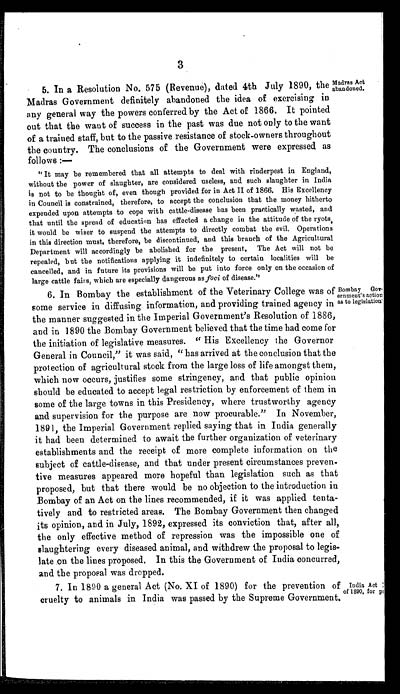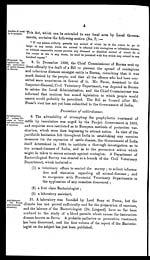Medicine - Veterinary > Civil Veterinary Departments > Civil Veterinary Department ledger series I-VI > Volume VI - Repression and prevention of cattle-diseases in India
(465) Page 3
Download files
Individual page:
Thumbnail gallery: Grid view | List view

3
Madras Act
abandoned.
5. In a Resolution No. 575 (Revenue), dated 4th July 1890, the
Madras Government definitely abandoned the idea of exercising in
any general way the powers conferred by the Act of 1866. It pointed
out that the want of success in the past was due not only to the want
of a trained staff, but to the passive resistance of stock-owners throughout
the country. The conclusions of the Government were expressed as
follows:—
"It may be remembered that all attempts to deal with rinderpest in England,
without the power of slaughter, are considered useless, and such slaughter in India
is not to be thought of, even though provided for in Act II of 1866. His Excellency
in Council is constrained, therefore, to accept the conclusion that the money hitherto
expended upon attempts to cope with cattle-disease has been practically wasted, and
that until the spread of education has effected a change in the attitude of the ryots,
it would be wiser to suspend the attempts to directly combat the evil. Operations
in this direction must, therefore, be discontinued, and this branch of the Agricultural
Department will accordingly be abolished for the present. The Act will not be
repealed, but the notifications applying it indefinitely to certain localities will be
cancelled, and in future its provisions will be put into force only on the occasion of
large cattle fairs, which are especially dangerous as foci of disease."
Bombay Gov-
ernment's action
as to legislation
6. In Bombay the establishment of the Veterinary College was of
some service in diffusing information, and providing trained agency in
the manner suggested in the Imperial Government's Resolution of 1886,
and in 1890 the Bombay Government believed that the time had come for
the initiation of legislative measures. "His Excellency the Governor
General in Council," it was said, "has arrived at the conclusion that the
protection of agricultural stock from the large loss of life amongst them,
which now occurs, justifies some stringency, and that public opinion
should be educated to accept legal restriction by enforcement of them in
some of the large towns in this Presidency, where trustworthy agency
and supervision for the purpose are now procurable." In November,
1891, the Imperial Government replied saying that in India generally
it had been determined to await the further organization of veterinary
establishments and the receipt of more complete information on the
subject of cattle-disease, and that under present circumstances preven-
tive measures appeared more hopeful than legislation such as that
proposed, but that there would be no objection to the introduction in
Bombay of an Act on the lines recommended, if it was applied tenta-
tively and to restricted areas. The Bombay Government then changed
its opinion, and in July, 1892, expressed its conviction that, after all,
the only effective method of repression was the impossible one of
slaughtering every diseased animal, and withdrew the proposal to legis-
late on the lines proposed. In this the Government of India concurred,
and the proposal was dropped.
India Act
of 1890, for p
7. In 1890 a general Act (No. XI of 1890) for the prevention of
cruelty to animals in India was passed by the Supreme Government.
Set display mode to: Large image | Zoom image | Transcription
Images and transcriptions on this page, including medium image downloads, may be used under the Creative Commons Attribution 4.0 International Licence unless otherwise stated. ![]()
| India Papers > Medicine - Veterinary > Civil Veterinary Departments > Civil Veterinary Department ledger series I-VI > Repression and prevention of cattle-diseases in India > (465) Page 3 |
|---|
| Permanent URL | https://digital.nls.uk/75517292 |
|---|




